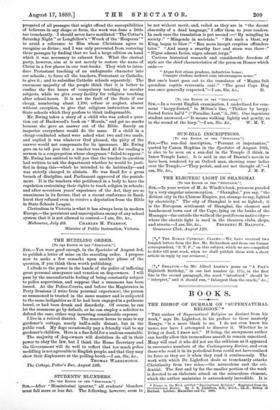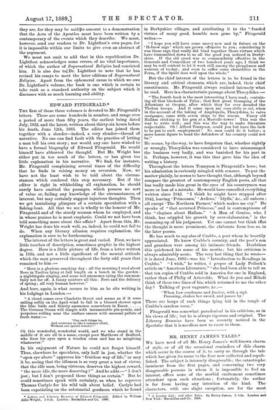BOOKS.
THE BISHOP OF DURHAM ON "SUPERNATURAL RELIGION."*
" THE author of Supernatural Religion as distinct from his work," says Dr. Lightfoot, in his preface to these masterly Essays, "is a mere blank to me. I do not even know his name, nor have I attempted to discover it. Whether he is living or dead, I know not." If living, the anonymous author can hardly allow this tremendous assault to remain unnoticed.. Many will read it who did not see the criticism as it appeared in successive numbers of the Contemporary Review, and even those who read it in its periodical form could not have realised its force as they see it when they read it continuously. The work with which Dr. Lightfoot deals so trenchantly attacks Christianity from two sides,—the miraculous and the evi- dential. The first and by far the smaller portion of the work is devoted to an elaborate attack on the miraculous element, which the author maintains is antecedently incredible. It is • Essays on the Work entitled " Supernatural Religion." Reprinted from the Contemporary Review. By J. B. Lightfoot, D.D., D.C.L., LL.D., Bishop of Durham. London: Macmillan and Co. 1889.
obvious that if he could demonstrate this part of his case— and he thinks he has demonstrated it—the rest of his work would be superfluous. The fact that he devotes the bulk of his work to an assault on the genuineness and authenticity of the New Testament Canon betrays a lurking, albeit unconscious, misgiving as to the effectiveness of the argument against miracles. It is with the latter portion only of Supernatural Religion that Dr. Lightfoot deals, and he certainly shows no quarter. He begins by playfully suggesting that the book which he undertakes to answer is not the book which, under the same name, reviewers had been praising for its " scholarship," " ability," learning, and critical acumen, for these are qualities which he finds singularly lacking in the work before him, and he proceeds at once, con amore, to justify his indictment. There is no need, however, to dwell on Dr. Lightfoot's proofs of the author's defective scholarship, not only in Greek and Latin, but even in German. He professes to have "shown that the author does not possess the elementary knowledge which is indispensable in a critical scholar," and we may safely leave our classical readers to judge for themselves how far this serious charge is made good. We prefer to give some samples of Dr. Lightfoot's criticism on points where his argument can be followed even by unlearned readers.
The author of Supernatural Religion builds a plausible argument against the New Testament Scriptures on the silence of Eusebius. His fundamental assumption is, that when Eusebius does not mention a reference to or quotation from any Canonical book in any writer of whom he may be speaking, then the writer in question was himself silent. Nothing can be more neat and telling than the ease with which Dr. Lightfoot retorts the argument from the silence of Eusebius. Unfortu- nately for the author of Supernatural Religion, Eusebius him- self explains the method he intends to pursue in his inquiry respecting the Canon of Scripture, which was not then settled as we have it now. There was no question, indeed, with respect to the main body of the New Testament; but there were some writings whose Canonical authority was disputed, such as the Second Epistle of St. Peter, and his Acts, Gospel, Preaching, and Apocalypse ; also the Epistle to the Hebrews, the Shepherd of Hermas, and the Acts of Paul. These two classes of writings Eusebius proposes to treat in two different ways. He will record every instance in which he finds any of the disputed class quoted or need—he evidently means as Scripture—and also anything of interest respecting them. It would be superfluous, on the other hand, to quote testimonies to the Canonicity of the undisputed writings ; and in their case, therefore, he proposes to record only anecdotes, and anything else of interest that he may have come across in his reading. This distinction is quite clear. Eusebius promises to relate everything he can find concerning the disputed writings, so that his readers may judge for themselves how far they were accepted as genuine. The genuineness and authenticity of the Scriptures received as Canonical not being in dispute, it would be unnecessary to offer evidence on that point, and Eusebius accordingly tells his readers that they are to expect merely illustrative allusions and anecdotes. His silence having thus been explained by himself beforehand, it follows that no argument can be based upon it against the main body of the New Testament Scriptures, such as the Gospels, Acts, Pauline Epistles, and the First Epistle of St. John. Here, then, we have the limits within which he proposed to conduct his inquiry, clearly laid down by Eusebins himself. And, what is more important, we have the means of testing the fidelity with which he fulfils his promise. Of the writings which he uses in his History, some have perished, while others have come down to as. If, therefore, we find among the extant works referred to by Eusebins clear testimony to the Canonicity of the New Testa- ment which, however, he does not quote, it is plain that his silence, as previously explained by himself, proves nothing against the authority of the then accepted Canon, but rather the contrary. In the Epistle of Clement of Rome, for example, we have quotations from the New Testament as we now possess it, and St. Paul's First Epistle to the Corinthians is quoted directly by name. But all that Eusebius says of Clement is that, by " putting forward many thoughts (of the Epistle) to the Hebrews, and even employing some passages from it word for word, he shows most clearly that the docu- ment was not recent (when he wrote)." Eusebius is quite accurate here; Clement undoubtedly uses the Epistle to
the Hebrews as authoritative Scripture. But he does not name the Epistle to the Hebrews directly, as he does the First Epistle to the Corinthians. Here, then, is a crucial proof that the silence of Eusebius in his references to ancient authors does not mean the silence of those authors themselves. He simply does not waste time and space in proving what nobody disputed. The Pauline Epistles were then received as Canonical; therefore Eusebius deliberately omits, in accordance with his undertaking, Clement's explicit appeal to the First Epistle to the Corinthians. This con- clusive way of testing the method of controversy pursued by the author of Supernatural Religion is followed by Dr. Lightfoot with overwhelming effect through the Ignatian Epistles, the Epistle of Polycarp, the Apology of Justin Martyr, the writings of Irenmus, and others. We must refer our readers to Dr. Lightfoot's own book in order to appreciate the exhaustive character of his argument ; but we shall refer to the case of Irenmus by way of specimen. In his work on Heresies, Irenaus " quotes the Acts again and again, and directly ascribes it to St. Luke. He likewise cites twelve out of the thirteen Epistles of St. Paul, the exception being the short letter to Philemon. These twelve he directly ascribes to the Apostle in one place or another, and, with the exception of i. Timothy and Titus, he gives the names of the persons addressed ; so that the identification is complete. The list of references to St. Paul's Epistles alone occupies two octavo pages of three columns each in the index to Stieren's Irenwus." Yet all this mass of evidence, showing that Irenmus was perfectly •familiar with the New Testament Scriptures as Canonical writings, is passed over in silence by Eusebius. And he repeats explicitly his reason for this omission :—
" Since at the commencement of our treatise we have made a promise, saying that we should adduce at the proper opportunities the utterances of the ancient elders and writers of the Church, in which they have handed down in writing the traditions that reached them concerning the Canonical Scriptures, and IrenEens was one of these, let me now adduce his notices also, and first those relating to the Sacred Gospels, as follows."
Eusebius then quotes a passage from Irenmis, relating the circumstances under which the Four Gospels were written, but none of the passages in which Irenwns shows his intimate acquaintance with the New Testament generally. This, as he reminds his readers, is in strict accordance with the rule which he had laid down for himself in his different treatment of the received and disputed sacred writings of his time.
These being the facts, how does the author of Super- natural Religion deal with them ? All through his work, he assumes and asserts dogmatically that Eusebius "knows
nothing" of any testimonies to the Canonical Scriptures which he does not quote. Eusebins's own warning ought to have saved our anonymous author from this gratuitous assumption. But if he had any doubt on the subject, why did he not test the matter by examining, as Dr. Lightfoot has done, the extant writings to which Eusebius refers P Instead of this, he translates a hardly reasonable doubt into a dogmatic state- ment of fact which the slightest caution and care would have shown him to be absolutely groundless. The silence of Eusebius has been explained by himself, and the writers, about whose testimony to the Canonical Scriptures he is silent, and whose writings have come down to us, bear ample testimony to the facts of which the author of Supernatural Religion asserts that they are ignorant. It is obvious to remark that an exposure of this sort, if it be not refuted, suffices to discredit the book of which it forms one of the cardinal arguments. But Dr. Lightfoot's Essays prove, in ample detail, that the argument from the silence of Eusebins is a fair specimen of the general style of criticism which pervades Supernatural Religion. Since the original ap-
pearance of these Essays, the evidence against the argument of Supernatural Religion has greatly accumulated. There is, for instance, Dr. Lightfoot's own learned and elaborate vindication of the Ignatian Epistles—a vindication not seriously assailed even in Germany—and the discovery of the actual Diatissaron of Tatian. These two facts alone make a formidable inroad on the destructive criticism of the author
of Supernatural Religion, and even undermine the foundation on which his whole superstructure is raised. In an appendix, Dr. Lightfoot adds an exceedingly interesting essay on "Dis- coveries Illustrating the Acts of the Apostles." Here Dr. Lightfoot draws his facts chiefly from General Cesnola's Oyprus and Mr. Wood's Ephesus ; and very important facts they are, for they may be said Ito amount to a demonstration that the Acts of the Apostles must have been written by a contemporary of the events which they describe: We must, however, send our readers to Dr. Lightfoot's own pages, for it is impossible within our limits to give even an abstract of the argument.
We must not omit to add that in this republication Dr. Lightfoot acknowledges some errors, of no vital importance, of which the author of Supernatural Religion had convicted him. It is also due to' Dr. Lightfoot to note that he has revised his essays to meet the .later editions of Supernatural Religion. Apart from the ephemeral cause to which we owe Dr. Lightfoot's volume, the book is one which is certain to take rank as a standard authority on the subject which it discusses with so much learning and ability.




































 Previous page
Previous page